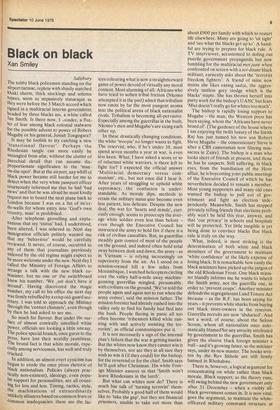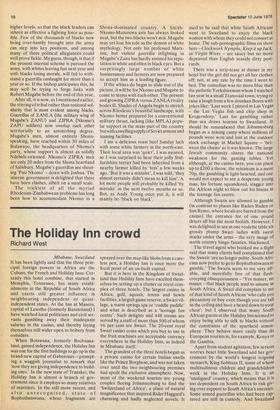Black on black
Xan Smiley
Salisbury The tubby black policemen standing on the airport tarmac, replete with shinily starched khaki shorts, thick stockings and solemn topees, seem as • impassively statuesque as they were before the 3 March accord which Signed in a multiracial interim government headed by three blacks am. a white called Ian Smith. Is there now, I ../onder, a flutter of fear among black colonial stalwarts for the possible advent to power of RObert Mugabe or his general, Josiah Tongogara?
It may be foolish to try catching a new 'transitional flavour'. Perhaps the Rhodesian tangle can more easily be untangled from afar, without the clutter of Parochial detail that can assume disProportionate significance to the 'manOn-the-spot'. But at the airport, any whiff of black power became still harder for me to detect when the very white passport officer courteously informed me that he had 'bad news' and that he was afraid he must kindly request me to board the next plane back to London because I was on a list of ne'erdo-wells for whom entry into 'God's own country, man' is prohibited.
After telephone grovelling and explanations that my 'status' had, I understood, been altered, I was ushered in. Next day immigration officials politely warned me that my 'behaviour' would be carefully reviewed. It never, of course, occurred to any of them that journalists previously unloved by the old regime might expect to be more welcome under the new. Next day I called the Ministry of Foreign Affairs to arrange a talk with the new black cominister, but no one or the switchboard knew his number. 'We ,ust don't have it around'. Having discovered the magic number, my call to his office the next day Was firmly rebuffed by a crisp old-guard secretary. I was told to approach the Minister through the 'correct channels', even though by then he had asked to see me.
So much for flavour. But under the surface of almost comically unsullied white Power, officials are looking a little uneasy. The police special branch, once gurus to the Press, have lost their worldly jauntiness. The brutal fact is that white morale, especially among servicemen, has well and truly cracked.
In addition, an almost overt cynicism has begun to erode the once pious rhetoric of black nationalism. Policies (always practically non-existent), ideology, even popular support for personalities, are all counting for less and less. Timing, tactics, style, the machinations of extraordinarily unlikely alliances based on common fears or common inadequacies: these are the fac
tors colouring what is now a straightforward game of power devoid of virtually any moral content. Most alarming of all: Africans who have tried to soften tribal friction (Nkomo attempted it in the past) admit that tribalism now emits by far the most pungent aroma into the political arena of black nationalist rivals. Tribalism is becoming all-pervasive. Especially among the guerrillas in the bush, Nkomo's men and Mugabe's are sizing each other up.
In these drastically changing conditions, the white 'troopie' no longer wants to fight. The reservist, who, if he's under 38, must spend seven months a year at war, is even less keen. What, I have asked a score or so of reluctant white warriors, is there left to fight for? I expected the official answer 'Multiracial democracy versus communism', etc., but not once did I hear it. After years of struggling to uphold white supremacy, the confusion is understandable. As morale dips, methods to retain the military status quo become even less patient, less delicate. Despite the new deal, the war for 'hearts and minds', curiously enough, seems to preoccupy the average white soldier even less than before — even though the Executive Council has instructed the army to hold fire if there is a risk of civilian casualties. But, as guerrillas steadily gain control of most of the people on the ground, and indeed often hold total sway between dusk and dawn, the army —as in Vietnam — is relying increasingly on
superiority from the air. As I stood on a mission-owned hill a few miles from Mozambique, I watched helicopters circling over the valley half-a-mile away machinegunning guerrillas mingled, presumably, with civilians on the ground. ;We've told the people again and again not to run when the army comes', said the mission father. The mission forester had already rushed into the valley only to find his family had fled into the bush. People fleeing in panic all too often become 'tribesmen killed while running with and actively assisting the terrorists', as official communiques put it.
It is not necessarily a sign of the internal plan's failure that the war is getting nastier.
But the whites now know they cannot win it by themselves, nor are they at all sure they wish to win it (if they could) for the bishop, for the reverend or for the chief. Smith says he'll quit after Christman. His white Foreign Minister assures us that 'Smith won't leave Rhodesians in the lurch'.
But what can whites now do? There is much bar talk of 'turning terrorist' them selves. Probably a good half of them would like to 'take the gap', but they are financial prisoners, unable to take out more than
about £900 per family with which to restart life elsewhere. Many are going to 'sit tight' and 'see what the blacks get up to'. A handful are trying to prepare for black rule. A TV interviewer, accustomed to doling out puerile government propaganda but now fumbling for the multiracial mot juste when confronted on screen with a soi-disant black militant, earnestly asks about the 'terrorist freedom fighters'. A friend of mine now insists she likes eating sadza, the aggressively tastless grey stodge which is the blacks' staple. She has thrown herself into party work for the bishop's UANC but fears 'Muz doesn't really go for whites too much'.
The bishop is rapidly losing support to Mugabe — the man, the Western press has been saying, whom the 'Africans have never heard of. (The gardener of the house where I am enjoying the twilit luxury of the Smith Raj has just named his new son Robert Steve Mugabe — the concessionary Steve is after a CBS cameraman now filming massacres in Zaire). The bishop is a man who looks short of friends at present, and those he has he suspects. Still suffering, in black eyes, from the humiliation of the Hove affair, he is boycotting joint public meetings of the Executive Council of which he has nevertheless decided to remain a member. Most young supporters and many old ones wanted the bishop to pull out of government and fight an election independently. Meanwhile, Smith has stopped privately telling friends that elections probably won't be held this year, anyway, and that 'our privacy' in schools and hospitals will be protected. Yet little tangible is yet being done to convince blacks that black rule is truly on the way.
What, indeed, is most striking is the determination of both white and black members of the government to maintain 'white confidence' at the likely expense of losing black. It is remarkable how easily the black ministers have picked up the jargon of the old Rhodesian Front. One black minister blandly informs me he wants to inherit the Smith army, not the guerrilla one, in order to 'prevent coups'. Another minister defends the segregationist Land Tenure Act because — as the R.F. has been saying for years — it prevents white sharks from buying out black store-owners in the reserves. Guerrilla recruits are now 'abducted'. And not a word, of course, about the Selous Scouts, whom all nationalists once automatically blamedior any atrocity attributed by government to the guerrillas. Smith has given the elusive black foreign minister a bull —and it's growing fatter, so the minister says, under its new master. The books written by the Rev Sithole are still firmly banned in Rhobabwe.
There is, however, a logical argument for concentrating on white rather than black morale. Black support, so the theory runs, will swing behind the new government only after 31 December — when a visibly allblack government comes in. It is now vital, goes the argument, to maintain the whiteofficered military command structure at higher levels, so that the black leaders can inherit as effective a fighting force as possible. Few of the thousands of blacks now being over-hastily brought into the army can step into key positions, and among many of them political allegiances could well prove fickle. My guess, though, is that if the present internal scheme is pursued the army, with whites leaving fast next year and with blacks losing morale, will fail to withstand a guerrilla onslaught for more than a year or so. If the bishop anticipates this, he may well be trying to forge links with Robert Mugabe before the end of this year.
After all, it is now, as I mentioned earlier, the stirring of tribal rather than national solidarity that is most evident among blacks. Guerrillas of ZANLA (the military wing of Mugabe's ZANU) and ZIPRA (Nkomo's ZAPU soldiers) now overlap each other territorially to an astonishing degree. Mugabe's men, almost entirely Shonaspeaking, have reached within 30 miles of Bulawayo, the headquarters of Nkomo's party, whose support is almost as solidly Ndebele-oriented. Nkomo's ZIPRA men are only 20 miles from the Shona heartland of Salisbury. Mugabe's guerrillas are shouting `Pasi Nkomo' — down with Joshua. The interim government is delighted that there have been clashes, albeit on a small scale.
The trickiest of all the myriad Rhodesian-Zimbabwean problems has long been how to accommodate Nkomo in a Shona-dominated country. A SmithNkomo-Muzorewa axis has always looked neat, but the two blacks won't mix. Mugabe may yet lose his role as the demon of white mythology. Not only his professed Marxism, but violent guerrilla infighting in Mugabe's Zanu has hardly assisted his reputation in white and often in black eyes. But a surprisingly large number of white businessmen and farmers are now prepared to accept him as a leading figure.
If the whites do begin to slide out of the picture, it will be for Nkomo and Mugabe to come to terms with each other. The present and growing ZIPRA versus ZANLA rivalry bodes ill. Shades of Angola begin to stretch across Rhodesia's beautiful landscape, with Nkomo better prepared for a conventional military thrust, lacking (like MPLA) popular support in the main part of the country but with a swelling supply of Soviet armour and training facilities.
I ate a delicious roast beef Sunday luch with some white farmers in the north-east. Their local area was 'quiet', I was assured, so I was surprised to hear their jolly Staffordshire terrier had been inherited from a nearby farmer killed by `ters' a few weeks ago. `But it was a mistake', I was told, 'they almost certainly didn't mean to kill him'. A lot more people will probably be killed 'by mistake' in the next twelve months or so. But, as Andy Young once put it, it will mainly be 'black on black'.



































 Previous page
Previous page